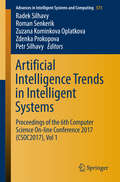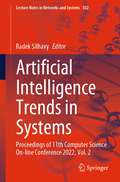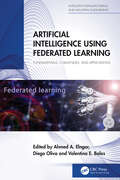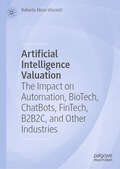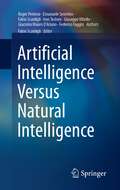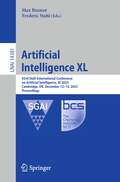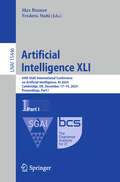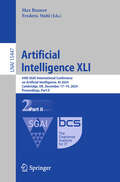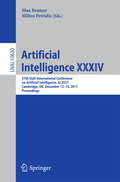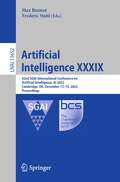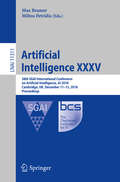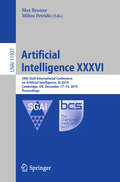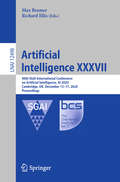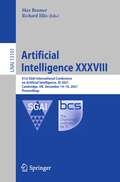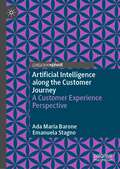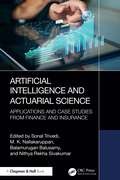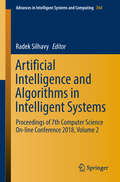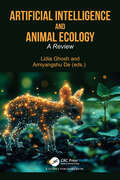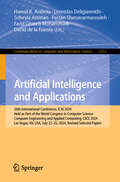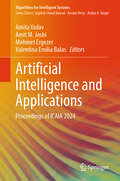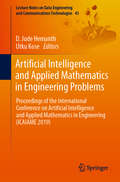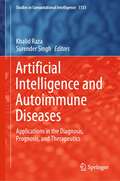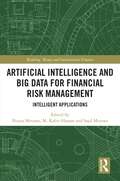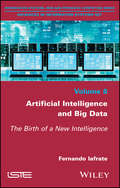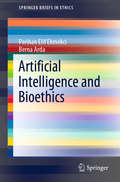- Table View
- List View
Artificial Intelligence Trends in Intelligent Systems: Proceedings of the 6th Computer Science On-line Conference 2017 (CSOC2017), Vol 1 (Advances in Intelligent Systems and Computing #573)
by Radek Silhavy Roman Senkerik Zuzana Kominkova Oplatkova Petr Silhavy Zdenka ProkopovaThis book presents new methods and approaches to real-world problems as well as exploratory research that describes novel artificial intelligence applications, including deep learning, neural networks and hybrid algorithms. This book constitutes the refereed proceedings of the Artificial Intelligence Trends in Intelligent Systems Section of the 6th Computer Science On-line Conference 2017 (CSOC 2017), held in April 2017.
Artificial Intelligence Trends in Systems: Proceedings of 11th Computer Science On-line Conference 2022, Vol. 2 (Lecture Notes in Networks and Systems #502)
by Radek SilhavyThis book covers themes related to artificial intelligence in systems and networks application. Selected papers explore modern neural networks application, optimization and hybrid and bio-inspired algorithms are covered too. The refereed proceedings of the Artificial Intelligence Trends in Systems part of the 11th Computer Science On-line Conference 2022 (CSOC 2022), conducted online in April 2022, are included in this volume.
Artificial Intelligence Using Federated Learning: Fundamentals, Challenges, and Applications (Intelligent Manufacturing and Industrial Engineering)
by Diego Oliva Valentina E. Balas Ahmed A. ElngarFederated machine learning is a novel approach to combining distributed machine learning, cryptography, security, and incentive mechanism design. It allows organizations to keep sensitive and private data on users or customers decentralized and secure, helping them comply with stringent data protection regulations like GDPR and CCPA.Artificial Intelligence Using Federated Learning: Fundamentals, Challenges, and Applications enables training AI models on a large number of decentralized devices or servers, making it a scalable and efficient solution. It also allows organizations to create more versatile AI models by training them on data from diverse sources or domains. This approach can unlock innovative use cases in fields like healthcare, finance, and IoT, where data privacy is paramount.The book is designed for researchers working in Intelligent Federated Learning and its related applications, as well as technology development, and is also of interest to academicians, data scientists, industrial professionals, researchers, and students.
Artificial Intelligence Valuation: The Impact on Automation, BioTech, ChatBots, FinTech, B2B2C, and Other Industries
by Roberto Moro-ViscontiThe book discusses the main valuation methodologies of artificial intelligence (AI). Company valuation goes hand in hand with estimating intangible assets like AI, which are linked to higher risk and lower collateral value. Their accounting is controversial, and the most widely used valuation approaches are based on market, income, or cost-related metrics.The volume discusses in detail the valuation approaches such as the discounted cash flows (remembering that “cash is king”) or the empirical market multipliers and comparables. The approaches are complemented by several models, including advanced business planning that incorporates machine learning, digital scalability networks, or validating blockchains. The book, with a tailor-made theoretical background backed by empirical cases, shows how to evaluate AI products, such as chatbots or virtual assistants, for AI established producers, startups, or traditional “brick-and-mortar” AI users. The comprehensive set of techniques and methodologies will interest researchers, students, and practitioners in corporate finance, intellectual property valuation, and financial technology.
Artificial Intelligence Versus Natural Intelligence
by Roger Penrose Emanuele Severino Ines Testoni Fabio Scardigli Giuseppe Vitiello Federico Faggin Giacomo Mauro D'ArianoThis book centers around a dialogue between Roger Penrose and Emanuele Severino about one of most intriguing topics of our times, the comparison of artificial intelligence and natural intelligence, as well as its extension to the notions of human and machine consciousness.Additional insightful essays by Mauro D'Ariano, Federico Faggin, Ines Testoni, Giuseppe Vitiello and an introduction of Fabio Scardigli complete the book and illuminate different aspects of the debate. Although from completely different points of view, all the authors seem to converge on the idea that it is almost impossible to have real "intelligence" without a form of "consciousness". In fact, consciousness, often conceived as an enigmatic "mirror" of reality (but is it really a mirror?), is a phenomenon under intense investigation by science and technology, particularly in recent decades. Where does this phenomenon originate from (in humans, and perhaps also in animals)? Is it reproducible on some "device"? Do we have a theory of consciousness today? Will we arrive to build thinking or conscious machines, as machine learning, or cognitive computing, seem to promise? These questions and other related issues are discussed in the pages of this work, which provides stimulating reading to both specialists and general readers.The Chapter "Hard Problem and Free Will: An Information-Theoretical Approach" is available open access under a Creative Commons Attribution 4.0 International License via link.springer.com.
Artificial Intelligence XL: 43rd SGAI International Conference on Artificial Intelligence, AI 2023, Cambridge, UK, December 12–14, 2023, Proceedings (Lecture Notes in Computer Science #14381)
by Max Bramer Frederic StahlThis book constitutes the refereed proceedings of the 43rd SGAI International Conference on Artificial Intelligence, AI 2023, held in Cambridge, UK, during December 12–14, 2023.The 27 full papers and 20 short papers included in this book are carefully reviewed and selected from 67 submissions. They were organized in topical sections as follows: Technical Papers: Speech and Natural Language Analysis, Image Analysis, Neural Nets, Case Based Reasoning and Short Technical Papers. Application Papers: Machine Learning Applications, Machine Vision Applications, Knowledge Discovery and Data Mining Applications, other AI Applications and Short Application Papers.
Artificial Intelligence XLI: 44th SGAI International Conference on Artificial Intelligence, AI 2024, Cambridge, UK, December 17–19, 2024, Proceedings, Part I (Lecture Notes in Computer Science #15446)
by Max Bramer Frederic StahlThis two-volume set, LNAI 15446 and LNAI 15447, constitutes the refereed proceedings of the 44th SGAI International Conference on Artificial Intelligence, AI 2024, held in Cambridge, UK, during December 17–19, 2024. The 36 full papers and 18 short papers presented in these two volumes were carefully reviewed and selected from 80 submissions. Part I includes papers from the Technical stream, whereas Part II includes papers from the Application stream. These volumes are organized into the following topical sections: - Part I: Neural nets; Deep learning; Large language models; Machine learning; Evolutionary and genetic algorithms; Knowledge management, Short Technical Papers. Part II: Machine vision; Evaluation of AI systems; Applications of machine learning; Other AI applications, Short Application Papers.
Artificial Intelligence XLI: 44th SGAI International Conference on Artificial Intelligence, AI 2024, Cambridge, UK, December 17–19, 2024, Proceedings, Part II (Lecture Notes in Computer Science #15447)
by Max Bramer Frederic StahlThis two-volume set, LNAI 15446 and LNAI 15447, constitutes the refereed proceedings of the 44th SGAI International Conference on Artificial Intelligence, AI 2024, held in Cambridge, UK, during December 17–19, 2024. The 36 full papers and 18 short papers presented in these two volumes were carefully reviewed and selected from 80 submissions. Part I includes papers from the Technical stream, whereas Part II includes papers from the Application stream. These volumes are organized into the following topical sections: - Part I: Neural nets; Deep learning; Large language models; Machine learning; Evolutionary and genetic algorithms; Knowledge management, Short Technical Papers. Part II: Machine vision; Evaluation of AI systems; Applications of machine learning; Other AI applications, Short Application Papers.
Artificial Intelligence XXXIV: 37th SGAI International Conference on Artificial Intelligence, AI 2017, Cambridge, UK, December 12-14, 2017, Proceedings (Lecture Notes in Computer Science #10630)
by Max Bramer Miltos PetridisThis book constitutes the proceedings of the 37th SGAI International Conference on Innovative Techniques and Applications of Artificial Intelligence, AI 2017, held in Cambridge, UK, in December 2017. The 25 full papers and 12 short papers presented in this volume were carefully reviewed and selected from 55 submissions. There are technical and application papers which were organized in topical sections named: machine learning and neural networks; machine learning, speech and vision and fuzzy logic; short technical papers; AI for healthcare; applications of machine learning; applications of neural networks and fuzzy logic; case-based reasoning; AI techniques; and short applications papers.
Artificial Intelligence XXXIX: 42nd SGAI International Conference on Artificial Intelligence, AI 2022, Cambridge, UK, December 13–15, 2022, Proceedings (Lecture Notes in Computer Science #13652)
by Max Bramer Frederic StahlThis book constitutes the proceedings of the 42nd SGAI International Conference on Innovative Techniques and Applications of Artificial Intelligence, AI 2022, which was held in Cambridge, UK, in December 2022.The 20 full papers and 11 short papers presented in this volume were carefully reviewed and selected from 40 submissions. The volume includes technical papers presenting new and innovative developments in the field as well as application papers presenting innovative applications of AI techniques in a number of subject domains. The papers are organized in the following topical sections: best technical paper; best application paper; AI for health and medicine; AI for scientific discovery and decision making; AI for industrial applications; feasibility studies of applied AI; and short papers.
Artificial Intelligence XXXV: 38th SGAI International Conference on Artificial Intelligence, AI 2018, Cambridge, UK, December 11–13, 2018, Proceedings (Lecture Notes in Computer Science #11311)
by Max Bramer Miltos PetridisThis book constitutes the proceedings of the 38th SGAI International Conference on Innovative Techniques and Applications of Artificial Intelligence, AI 2018, held in Cambridge, UK, in December 2018. The 25 full papers and 12 short papers presented in this volume were carefully reviewed and selected from 46 submissions. There are technical and application papers which were organized in topical sections named: Neural Networks; Planning and Scheduling; Machine Learning; Industrial Applications of Artificial Intelligence; Planning and Scheduling in Action; Machine Learning in Action; Applications of Machine Learning; and Applications of Agent Systems and Genetic Algorithms.
Artificial Intelligence XXXVI: 39th SGAI International Conference on Artificial Intelligence, AI 2019, Cambridge, UK, December 17–19, 2019, Proceedings (Lecture Notes in Computer Science #11927)
by Max Bramer Miltos PetridisThis book constitutes the proceedings of the 39th SGAI International Conference on Innovative Techniques and Applications of Artificial Intelligence, AI 2019, held in Cambridge, UK, in December 2019.The 29 full papers and 14 short papers presented in this volume were carefully reviewed and selected from 49 submissions. The volume includes technical papers presenting new and innovative developments in the field as well as application papers presenting innovative applications of AI techniques in a number of subject domains. The papers are organized in the following topical sections: machine learning; knowledge discovery and data mining; agents, knowledge acquisition and ontologies; medical applications; applications of evolutionary algorithms; machine learning for time series data; applications of machine learning; and knowledge acquisition.
Artificial Intelligence XXXVII: 40th SGAI International Conference on Artificial Intelligence, AI 2020, Cambridge, UK, December 15–17, 2020, Proceedings (Lecture Notes in Computer Science #12498)
by Richard Ellis Max BramerThis book constitutes the proceedings of the 40th SGAI International Conference on Innovative Techniques and Applications of Artificial Intelligence, AI 2020, which was supposed to be held in Cambridge, UK, in December 2020. The conference was held virtually due to the COVID-19 pandemic.The 23 full papers and 9 short papers presented in this volume were carefully reviewed and selected from 44 submissions. The volume includes technical papers presenting new and innovative developments in the field as well as application papers presenting innovative applications of AI techniques in a number of subject domains. The papers are organized in the following topical sections: neural nets and knowledge management; machine learning; industrial applications; advances in applied AI; and medical and legal applications.
Artificial Intelligence XXXVIII: 41st SGAI International Conference on Artificial Intelligence, AI 2021, Cambridge, UK, December 14–16, 2021, Proceedings (Lecture Notes in Computer Science #13101)
by Richard Ellis Max BramerThis book constitutes the proceedings of the 41st SGAI International Conference on Innovative Techniques and Applications of Artificial Intelligence, AI 2021, which was supposed to be held in Cambridge, UK, in December 2021. The conference was held virtually due to the COVID-19 pandemic.The 22 full papers and 10 short papers presented in this volume were carefully reviewed and selected from 37 submissions. The volume includes technical papers presenting new and innovative developments in the field as well as application papers presenting innovative applications of AI techniques in a number of subject domains. The papers are organized in the following topical sections: technical paper; machine learning; AI techniques; short technical stream papers; application papers; applications of machine learning; AI for medicine; advances in applied AI; and short application stream papers.
Artificial Intelligence along the Customer Journey: A Customer Experience Perspective
by Ada Maria Barone Emanuela StagnoThe development of several AI solutions has revolutionized the way in which consumers behave. Serving as a guide to the role that AI plays on different aspects of consumers’ life, this book provides a comprehensive understanding of the main artificial intelligence (AI) solutions available in the market. In particular, the authors adopt a customer experience approach to investigate how different AI technologies play a role at different stages of the customer journey (e.g., from pre-purchase to post-purchase decisions). Covering a range of technologies, such as augmented reality, voice assistants, chatbots and robots, readers will be able to learn which strategies and AI solutions are more effective at different stages of the customer journey.
Artificial Intelligence and Actuarial Science: Applications and Case Studies from Finance and Insurance
by Balamurugan Balusamy Sonal Trivedi Nallakaruppan M. K Nithya Rekha SivakumarThis book aims to explore how to automate, innovate, design, and deploy emerging technologies in actuarial work transformations for the insurance and finance sector. It examines the role of artificial intelligence with process automation in daily monitoring of solvency, governance, compliance, data processes, etc. It also explores the usage of machine learning, telematics system, AI-enabled claim processing software, Big Data and Algorithms, Explainable AI, and AI-enabled risk management tools in various actuarial processes.This book:• Presents case studies and best practices with real-world examples of successful and unsuccessful actuarial work transformation initiatives and transformation with emerging technologies• Offers deployment solutions for different applications of AI in actuarial work• Discusses how organizations can effectively incorporate AI into their current practices of actuarial work• Covers diverse emerging technologies, practices, and processes of actuaries from around the globe• Elaborates upon a framework for comprehending how big data and AI developments may affect insurance offers and their supervision• Explains how insurance companies may review and modify their current Risk Management Framework (RMF) to take into account some of the significant differences while implementing AI use casesThis reference book is for scholars, researchers and professionals interested in Artificial Intelligence and Actuarial Science.
Artificial Intelligence and Algorithms in Intelligent Systems: Proceedings Of 7th Computer Science On-line Conference 2018, Volume 2 (Advances In Intelligent Systems And Computing #764)
by Radek SilhavyThis book presents the latest trends and approaches in artificial intelligence research and its application to intelligent systems. It discusses hybridization of algorithms, new trends in neural networks, optimisation algorithms and real-life issues related to the application of artificial methods.The book constitutes the second volume of the refereed proceedings of the Artificial Intelligence and Algorithms in Intelligent Systems of the 7th Computer Science On-line Conference 2018 (CSOC 2018), held online in April 2018.
Artificial Intelligence and Animal Ecology: A Review
by Lidia Ghosh Amiyangshu DeArtificial Intelligence and Animal Ecology: A Review explores the transformative synergy between AI and animal ecology, unveiling how cutting-edge technology is revolutionizing ecological research and conservation. This pioneering book bridges these dynamic fields, demonstrating how AI techniques—such as evolutionary algorithms and optimization methods—both draw inspiration from and advance the study of animal behavior, species interactions, and environmental adaptation. With a strong focus on innovation, it examines groundbreaking AI applications, from bio-inspired algorithms and adaptive learning to breakthroughs in animal communication and behavioral analysis. Readers will gain valuable insights into how AI deciphers complex ecological dynamics, including navigation, vocal communication, and interspecies relationships. The book also addresses ethical considerations, ensuring responsible AI integration in ecological research.More than just a review, this book is a call to action. It empowers researchers, conservationists, and ecologists to embrace AI-driven solutions, fostering interdisciplinary collaboration and expanding the frontiers of ecological knowledge. As AI continues to evolve, Artificial Intelligence and Animal Ecology: A Review provides a vital roadmap for addressing environmental challenges with innovation and a deeper appreciation of the natural world.
Artificial Intelligence and Applications: 26th International Conference, ICAI 2024, Held as Part of the World Congress in Computer Science, Computer Engineering and Applied Computing, CSCE 2024, Las Vegas, NV, USA, July 22–25, 2024, Revised Selected Papers (Communications in Computer and Information Science #2252)
by Hamid R. Arabnia Leonidas Deligiannidis David de la Fuente Soheyla Amirian Farzan Shenavarmasouleh Farid Ghareh MohammadiThis book constitutes the proceedings of the 26th International Conference on Artificial Intelligence and Applications, ICAI 2024, held as part of the 2024 World Congress in Computer Science, Computer Engineering and Applied Computing, in Las Vegas, USA, during July 22 to July 25, 2024. The 38 full papers included in this book were carefully reviewed and selected from 376 submissions. They have been organized in topical sections as follows: Deep convolutional neural networks, ANNs, and applications; machine learning and novel applications; large language models and applications; data science, recognition and authentication methods and applications; artificial intelligence and applications; XXIV Technical Session on Applications of Advanced AI Techniques to information management for solving company-related problems.
Artificial Intelligence and Applications: Proceedings of ICAIA 2024 (Algorithms for Intelligent Systems)
by Valentina Emilia Balas Amita Yadav Amit M. Joshi Mehmet ErgezerThe papers in this book are high quality refereed papers presented at ICAIA 2024, the second International conference on Artificial Intelligence and Applications, held at Maharaja Surajmal Institute of Technology, New Delhi in collaboration with Wentworth Institute of Technology, Boston, USA in March 2024. This book presents new and innovative developments and applications in machine learning, data mining, neural networks, computation optimisation technologies, followed by research applications in signals, language and classification, prediction, recommendations, and systems. This book is essential for researchers and practitioners in this field.
Artificial Intelligence and Applied Mathematics in Engineering Problems: Proceedings of the International Conference on Artificial Intelligence and Applied Mathematics in Engineering (ICAIAME 2019) (Lecture Notes on Data Engineering and Communications Technologies #43)
by D. Jude Hemanth Utku KoseThis book features research presented at the 1st International Conference on Artificial Intelligence and Applied Mathematics in Engineering, held on 20–22 April 2019 at Antalya, Manavgat (Turkey). In today’s world, various engineering areas are essential components of technological innovations and effective real-world solutions for a better future. In this context, the book focuses on problems in engineering and discusses research using artificial intelligence and applied mathematics. Intended for scientists, experts, M.Sc. and Ph.D. students, postdocs and anyone interested in the subjects covered, the book can also be used as a reference resource for courses related to artificial intelligence and applied mathematics.
Artificial Intelligence and Autoimmune Diseases: Applications in the Diagnosis, Prognosis, and Therapeutics (Studies in Computational Intelligence #1133)
by Khalid Raza Surender SinghThe book provides an overview of various autoimmune disorders and how artificial intelligence (AI) and machine learning will be used for the diagnosis, prognosis, and treatment of these disorders. AI algorithms are used to create synthetic patient populations with the properties of actual patient cohorts, build personalized predictive models of drug combinations and unravel complex relationships between diet, microbiome, and genetic line-up to determine the comparative treatment response. The book highlights clinical applications and challenges of AI for the diagnosis and treatment/management of autoimmune disorders which includes Rheumatoid Arthritis (RA), Multiple Sclerosis (MS), Type I Diabetes, Psoriatic Arthritis (PsA), and other critical diseases.
Artificial Intelligence and Big Data for Financial Risk Management: Intelligent Applications (Banking, Money and International Finance)
by Hassan M. Kabir Metawa Saad Metawa NouraThis book presents a collection of high-quality contributions on the state-of-the-art in Artificial Intelligence and Big Data analysis as it relates to financial risk management applications. It brings together, in one place, the latest thinking on an emerging topic and includes principles, reviews, examples, and research directions. The book presents numerous specific use-cases throughout, showing practical applications of the concepts discussed. It looks at technologies such as eye movement analysis, data mining or mobile apps and examines how these technologies are applied by financial institutions, and how this affects both the institutions and the market. This work introduces students and aspiring practitioners to the subject of risk management in a structured manner. It is primarily aimed at researchers and students in finance and intelligent big data applications, such as intelligent information systems, smart economics and finance applications, and the internet of things in a marketing environment.
Artificial Intelligence and Big Data: The Birth of a New Intelligence
by Fernando IafrateWith the idea of “deep learning” having now become the key to this new generation of solutions, major technological players in the business intelligence sector have taken an interest in the application of Big Data. In this book, the author explores the recent technological advances associated with digitized data flows, which have recently opened up new horizons for AI. The reader will gain insight into some of the areas of application of Big Data in AI, including robotics, home automation, health, security, image recognition and natural language processing.
Artificial Intelligence and Bioethics (SpringerBriefs in Ethics)
by Perihan Elif Ekmekci Berna ArdaThis book explores major bioethical issues emerging from the development and use of artificial intelligence in medical settings. The authors start by defining the past, present and future of artificial intelligence in medical settings and then proceed to address the resulting common and specific bioethical inquiries. The book discusses bioethical inquiries in two separate sets. The first set is comprised of ontological discussions mainly focusing on personhood and being an ethical agent of an artefact. The second set discusses bioethical issues resulting from the use of artificial intelligence. It focuses particularly on the area of artificial intelligence use in medicine and health services. It addresses the main challenges by considering fundamental principles of medical ethics, including confidentiality, privacy, compassion, veracity and fidelity. Finally, the authors discuss the ethical implications of involvement of artificial intelligence agents in patient care by expanding on communication skills in a case-based approach. The book is of great interest to ethicists, medical professionals, academicians, engineers and scientists working with artificial intelligence.
